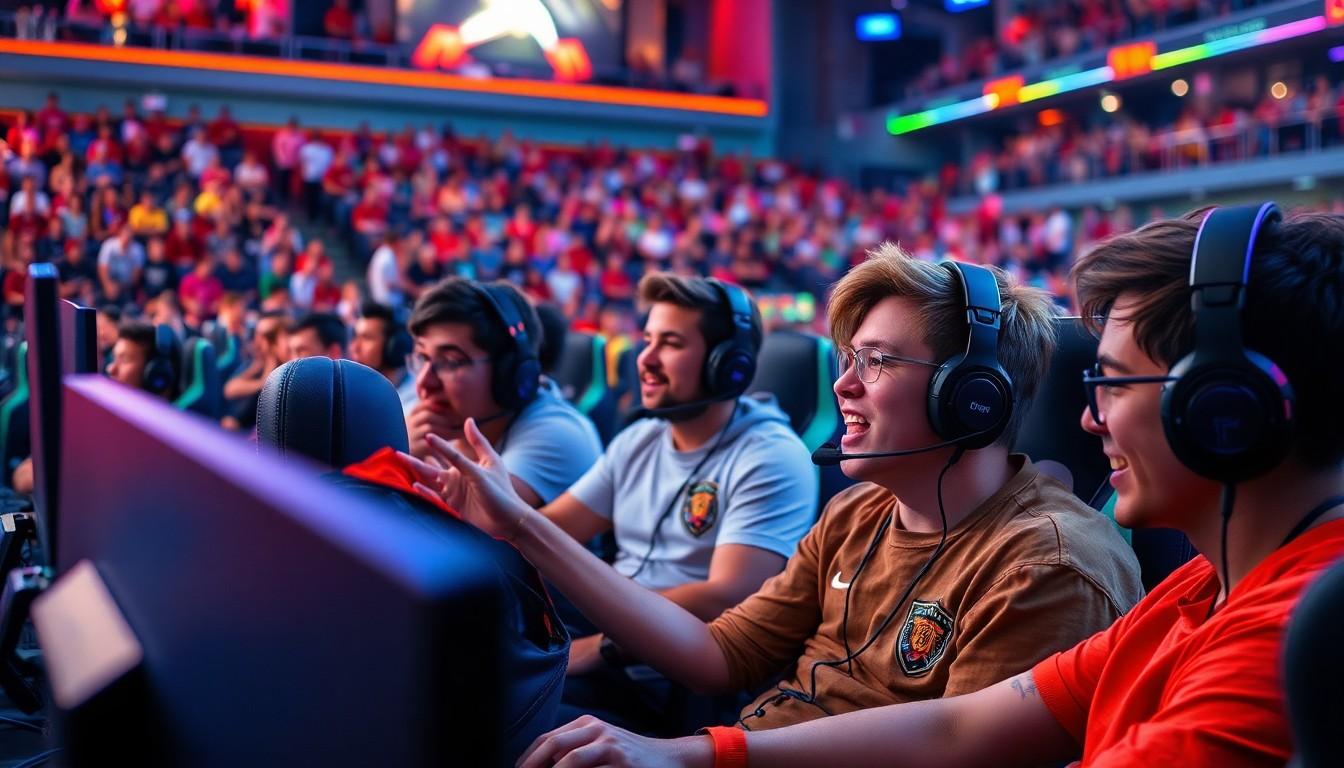In a world where the couch is the new arena and snacks are the official fuel, virtual tournaments have taken the gaming scene by storm. Picture this: players from all corners of the globe battling it out in epic showdowns, all while wearing pajamas. It’s like the Olympics, but with more pixels and fewer sprained ankles.
Virtual Tournament
Virtual tournaments represent a transformative shift in competitive gaming. These events allow players from various countries to compete in real-time, breaking geographical barriers. Traditional sporting events took decades to develop global outreach; virtual tournaments achieved this in just a few years. Players engage in multiple game genres, including first-person shooters, battle royales, and strategy games.
Popularity surged during the pandemic, as many turned to gaming for social interaction and entertainment. Virtual platforms, like Twitch and Discord, play significant roles in fostering community engagement. These platforms enable live streaming, allowing spectators to interact and support their favorite players.
Organizers leverage advanced technology to enhance user experience, including high-definition graphics, real-time analytics, and interactive features. Participants often join teams or clans, fostering camaraderie and teamwork. Prizes can vary from cash awards to sponsorship opportunities, motivating players to perform at their best.
Inclusivity is a hallmark of virtual tournaments. Gamers of all skill levels, from novices to professionals, participate in varying formats, including single-elimination brackets and round-robin contests. This accessibility attracts diverse audiences, contributing to the growing culture surrounding these tournaments.
Ultimately, virtual tournaments redefine competitive gaming. They create opportunities for networking and showcasing talent on a global stage. Innovative formats and community involvement ensure ongoing growth and evolution in the gaming landscape.
Types of Virtual Tournaments

Various types of virtual tournaments cater to different gaming preferences and community engagement levels. These events provide unique experiences for players and spectators alike.
Esports Tournaments
Esports tournaments represent a significant segment of the virtual tournament landscape. Competitors worldwide participate in multiplayer games like League of Legends, Dota 2, and Counter-Strike: Global Offensive. These tournaments often feature professional teams and skilled players who train rigorously. Prize pools for these events can reach millions of dollars, attracting elite talent. Broadcasted live on platforms like Twitch, these tournaments draw massive audiences, enhancing community interaction. Spectators engage through live chats, posting comments and reactions during matches. The excitement within esports tournaments showcases the growing importance of competitive gaming.
Skill-based Competitions
Skill-based competitions focus primarily on player ability and strategy. These tournaments often include genres like fighting games, racing simulations, and puzzle games. Gamers participate to demonstrate their prowess and refine their skills. Rankings and leaderboards track player performance, promoting healthy competition. Events like the Evo Championship Series exemplify how skill-based tournaments create a platform for enthusiastic gamers. Participants enjoy the thrill of competing against others with similar interests. Through these competitions, players build friendships and expand their networks while celebrating their dedication to gaming.
Benefits of Participating in Virtual Tournaments
Virtual tournaments offer numerous advantages that enhance the gaming experience and foster community connections. Players gain access to a global platform, allowing participation without geographical limitations.
Accessibility
Accessibility is a key benefit of virtual tournaments. Players can join from their homes using various devices, eliminating travel expenses and time constraints. Many platforms support diverse games, catering to various interests and skill levels. Often featuring user-friendly interfaces and tutorials, these tournaments empower newcomers to engage comfortably. Various scheduling options allow for flexibility, accommodating different time zones and personal commitments. This approach invites a broader spectrum of players, enhancing inclusivity within the gaming community.
Community Engagement
Community engagement thrives in virtual tournaments. Gamers connect through platforms like Twitch and Discord, facilitating real-time interactions during events. Participants often build friendships with teammates and opponents, enhancing their social experiences. Organizers frequently host live chats, enhancing spectator involvement and creating a vibrant atmosphere. Engagement extends beyond gameplay, with forums and online groups allowing players to share strategies and experiences. Such connections foster a supportive environment that cultivates teamwork and camaraderie, strengthening the global gaming community.
Challenges Faced in Virtual Tournaments
Virtual tournaments encounter distinct challenges that can affect the overall experience. These obstacles require careful attention to ensure seamless gameplay and player satisfaction.
Technical Issues
Technical issues disrupt the flow of virtual tournaments. Internet connectivity problems frequently arise, leading to lag or disconnections that hinder player performance. Participants rely on stable connections, and a drop can eliminate competitive integrity. Software glitches also pose significant threats, potentially causing game crashes or failures during crucial moments. Effective tournament organizers implement backup systems and provide technical support to address these situations. Keeping updated on the latest gaming technology helps mitigate some of these risks.
Player Interaction
Player interaction adds depth to virtual tournaments. Some participants struggle with communication due to platform limitations or poor audio quality. Building strategies and friendships occurs primarily through voice chat or messaging features, making effective communication essential. Many players experience feelings of isolation despite the competitive environment. Organizers focus on encouraging interaction through community events or social channels, promoting a sense of belonging. Engaging with established gaming communities fosters connections that enhance the overall tournament experience.
Reshaping the Landscape of Competitive Gaming
Virtual tournaments are reshaping the landscape of competitive gaming. They offer unprecedented opportunities for players to connect and showcase their skills on a global stage. The blend of advanced technology and community engagement creates a vibrant ecosystem that appeals to gamers of all backgrounds.
While challenges exist, the commitment of organizers to enhance player experience ensures that these events continue to thrive. As the culture around virtual tournaments grows, it paves the way for future innovations and inclusivity. The excitement and camaraderie fostered in these digital arenas will undoubtedly keep players returning for more, solidifying virtual tournaments as a cornerstone of the gaming world.

